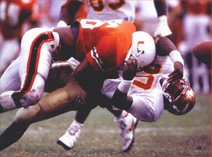 |
| Lawrence Phillips(Photo Credit: Spokeo) |
Written By: Nathan Skinner (@Canedude08)
Canes Rising Contributor
College football coaches have long stated that their primary objective is to mold men of character, men who will go on to do great things both on and off the field. While many of those men do go on to become pillars of the community, a fair number do not. The ones who don't usually flash their true colors early. Why are they allowed to play? How far are these "molders of men" willing to go in order to win?
"I wouldn't call it a beating" --Tom Osborne
If you are a person who remembers the 90s, you remember the Big Red Machine at Nebraska, right alongside rollerblades and pagers. The 'Huskers was arguably the most dominant college football program in the country, routinely steamrolling the opposition. Nebraska mauled teams with a talented I-Back, and a huge, imposing offensive line. The best I-Back during this era was Lawrence Phillips, a powerful runner from West Covina, California. Phillips ran wild through opposing defenses, accumulating 3,102 yards in three seasons. He was a rampaging beast, both on and off the field, he racked up yards and criminal charges. In 1995, Phillips was charged with assaulting his ex girlfriend, Nebraska basketball player Kate McEwen. The Nebraska back charged into McEwen's apartment and then proceeded to assault her, dragging her out of the apartment and down a flight of stairs by her hair. Head Coach Tom Osborne, when reinstating Phillips after a short suspension, remarked "I wouldn't call it a beating" when asked about the sordid affair. A couple of months later, the Phillips led Nebraska Cornhuskers defeated the University of Florida in the Tostitos Fiesta Bowl, claiming a national championship in the process. It's obvious that Phillips was allowed to play, merely because he was an extremely talented player. Osborne, whose public image is based upon a foundation of moral rectitude was allowed to play someone who should have been in the Lincoln jail, not running roughshod over the Gators. Where was the molding? Phillips learned that he could get away with anything, provided he was a productive athlete. The unfortunate news is that the world is a lot less sympathetic, people won't consistently overlook serious crimes. Phillips washed out of the NFL, spending twenty three days in jail during his brief stay with the St. Louis Rams. He was signed by other teams, and his criminal proclivities kept surfacing. Phillips was charged with assault while a member of the Miami Dolphins, and sexual assault while playing in the Canadian Football League. It should come as no surprise that the one time first round draft pick is now serving a 31 year sentence in California following another assault. The player who Dick Vermeil once said was the best running back he's ever coached, was arrested following an incident at a sandlot football game. Lawrence Phillips, former Nebraska star drove his vehicle into a crowd of teenagers, following a disagreement. He was already a suspect in other assaults, when he committed his final one as a free man. He's currently a suspect in the death of his cellmate as well, so apparently Phillips can't even stay clean in prison.
When one looks back at everything this man has done, it's obvious that this is a predator who can't function in society. Yet, Tom Osborne looked the other way and played someone who had been accused of a horrific crime. Would Osborne have been so accommodating had Philips been a walk on defensive linemen? Odds are he wouldn't have been. Yet, an entire state still respects and honors the man who was more than willing to aid and abet a vicious felon. How much is Osborne respected? The field at Memorial Stadium is named after him, and he was elected to the United States House of Representatives following his retirement in 1998.
"I'm only going to recruit the top 1% of the 1%"--Urban Meyer
 |
| Aaron Hernandez(Photo Credit:Getty Images) |
The seedy underbelly of the Florida program has been exposed by many media outlets, but Urban Meyer has rarely been asked to account for the behavior of his student athletes. Meyer can't be blamed for how Hernandez turned out to be a serial killer, a gangster, but he can be blamed for the fact that Hernandez was allowed to run roughshod through Gainesville. How can a player who may have failed multiple drug tests, assaulted a man, and potentially participated in a drive by never be suspended during a three year career? Meyer left Florida following the 2010 season, and is now the head coach at Ohio State, where he won the 2014 College Football Playoff, and claimed his third national championship.
The coaching profession hasn't changed much from the days of Bear Bryant and Barry Switzer When asked whether a coach would accept the integration of their program, former ESPN personality Beano Cook remarked "If Genghis Khan could turn the corner, he'd be recruited." While Beano was exaggerating, his statement isn't far from the truth. Coaches, desperate to win, and keep the millions flowing are willing to tolerate student-athletes who not only are disciplinary nightmares, but are potentially dangerous. In a society where University Presidents are graded not by how successful their students become, but by how many wins the football program has, coaches are justified in behaving in an unacceptable manner. Who will step up and stop this madness? Who will have the courage to stand up and end the cycle of hypocrisy and abuse?
Lawrence Phillips Article(1)
Lawrence Phillips Article (2)
Lawrence Phillips Article (3)




